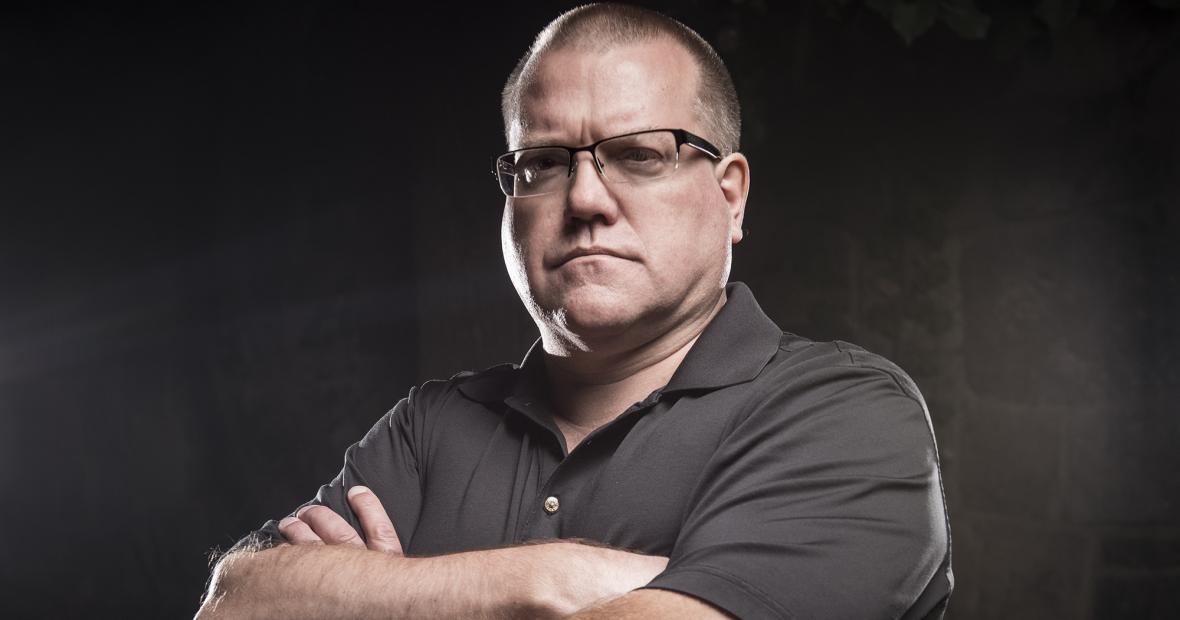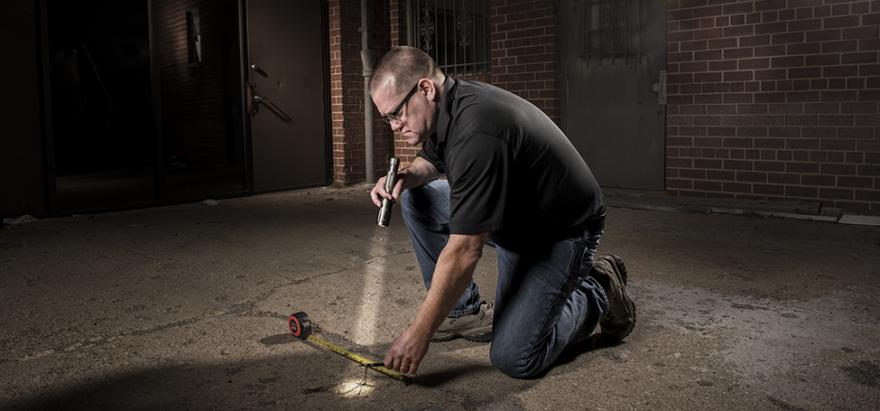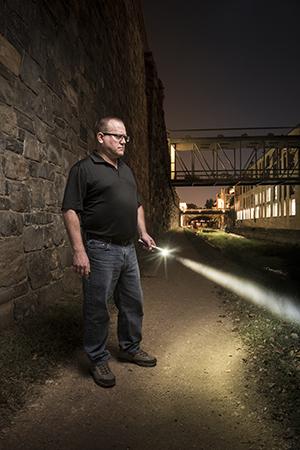Truth Detector
Well-honed skills plus an easygoing rapport gives this ex-cop-turned-PI an edge
The defendant said it was self-defense. The prosecution called it murder. And former homicide detective-turned-private investigator (PI) Todd Troutner ’89 got the phone call, asking him to figure out what really happened.
“My client was just arrested. You need to come up to the jail and take pictures to document any evidence that he was in a fight,” explained the criminal defense attorney. “Look for bruising and scratches.”
It was May 2012, and the case was Troutner’s first murder investigation as a PI. He’d worked dozens of violent crimes as a cop in Prince William County, Va., so he was thrilled to be back in the game. Troutner got in his car, drove to the Montgomery County Correctional Facility and began what turned into a seven-month quest to determine if the defendant, a 51-year-old Army veteran and security guard, had murdered his 23-year-old son.
In his five years as a private investigator, admits Troutner, “It’s my favorite case, but it was a horrible situation.” Hired by the defense to see if the man’s claim of self-defense was true, he started with a jailhouse interview of the father and then watched the initial videotaped interview by the police. Finally, he went to the crime scene — an opportunity not every jurisdiction grants to private investigators.
In this case, it was critical that Troutner examine the apartment where the shooting took place. He walked around and reinvestigated as if he were both evidence technician and cop, taking photos and measurements. “As I’m going through, I already knew the story so I had to make sure it made sense,” he says. He spotted a phone that was ripped out of the wall, for example, that matched the report. The prosecution’s theory was that the son was standing by a door at one end of a hallway when Dad deliberately took aim and shot him. Blood by that particular door and nearby carpet and tile supported that theory.
But Troutner noticed blood farther down the hall, closer to where dad was standing when he pulled the trigger, which wasn’t mentioned in the blood pattern analyst’s report. That blood supported the defense’s claim that the son was shot when he charged at his father after threatening to kill him, a theory that police and prosecutors had dismissed. In fact, said defense attorney Steve Kupferberg, the father had been beaten and choked and grabbed his gun “as a last resort.” In the end, the verdict was not guilty.
Kupferberg, who specializes in criminal defense and frequently works with Troutner, had been impressed with Troutner’s skills on a previous case, back when he was a cop. “I told Todd that if he ever got done with the police department he should speak to me about being our investigator. As far as I’m concerned, he’s the best in the business in the [Washington, D.C.] metropolitan area.”
A one-man show
People often think of the private investigator as the guy who follows cheating spouses; and there’s a segment of the industry that’s very good at that and works in teams, with cameras, recording devices, and other equipment. Troutner, however, operates alone and refers cases like that to other investigators. His main area is criminal defense work, from homicide and kidnappings to shootings and assaults, and civil cases, such as car crashes and work-site accidents.
Troutner likes to say he reinvestigates cases, searching for witnesses or evidence that might have been missed, video footage that wasn’t looked at, and statements in police and other reports that, in his experience as a former homicide investigator, don’t add up.
“I tell people I’m a fact investigator,” says the soft-spoken Troutner. “I work for the defense attorney but I’m not taking sides. When I investigate I look at all the facts, not just the ones that support our case. You need to give the attorney all of the information so they can make good choices for the client.”
The investigative process usually starts with a phone call from an attorney. Troutner gathers all the discovery the defense has — transcripts, photos, reports, recordings, affidavits — and comes up with his own plan for investigating the case. He often creates a to-do list for attorneys: Issue subpoenas for particular documents, send out a preservation letter to a store to keep a security video, get cell phone records, interview particular people.
In other cases, he’ll mainly focus on paperwork. “I have a murder case right now with well over 2,000 pages of police reports, forensics, and transcripts,” says Troutner, who is licensed to work in Virginia, Maryland, and Washington, D.C. “You have to be able to digest documents and pick out what’s important and what’s missing, and you need to present the findings of your investigation in a written report to a client — usually an attorney — in a way that makes sense.” He’ll see what questions weren’t asked and who was or wasn’t talked to; he’ll corroborate statements and follow up alibis that weren’t pursued. “I know what an investigation is supposed to look like and include; and if police and other official reports don’t have certain things, or they cut corners or made leaps of faith, or got tunnel vision and focused on just one guy, I look into it.”
There are good private investigators who haven’t been cops, he says, “but it’s a huge advantage when you’ve been one. You can read case files and see if it’s a good investigation.”
The best defense: A good PI
To Troutner, a private investigator is an essential part of an effective defense, yet “it’s a minute percentage of defendants that get one, so there are people going to trial without the best defense.” Many clients can’t afford a PI, or the court won’t appoint one, even if it’s an option. In some jurisdictions, he says, the prosecution isn’t required to hand the case file over to the defense — yet another critical reason for a good PI.
Sometimes, however, Troutner finds that witnesses aren’t wavering, or they corroborate official reports. In that case, the attorney may go back to his client with the findings and say, “We can take this to trial but you’re going to lose.” At other times, Troutner’s work has persuaded prosecutors to drop charges.
“I really appreciate talented investigators, and Todd brings together a remarkable series of skills,” says Fairfax, Va., trial lawyer Peter Everett. “He’s really smart and a strategic thinker. He comes back and says, ‘What about this angle, or that theory?’ It’s so far beyond what most people do that it really stands out.” Plus, says Everett, Troutner is good at establishing a rapport. “You often get people who say they don’t want to talk. He connects with witnesses, and that’s really important.”
The investigative approach he uses in civil cases is similar; a typical case is a car crash where Troutner is working for the injured party’s attorney. If the client says she suffered traumatic brain injury, Troutner asks witnesses how the injured party was acting; was she conscious, coherent, were there any obvious injuries? “You try to jog the witnesses’ memory,” he says. In other cases, he’ll look for traffic cameras or drive the route with a GoPro camera on the hood of his car to determine if a driver had an obstructed or clear view at an accident site. And he’ll review the accident report to see if something doesn’t make sense. “Some attorneys don’t realize that in addition to a report, it’s also important to get records of 911 calls from witnesses. I just had a case where I had to remind an attorney to get those.”
Becoming Detective Troutner
Private investigator is Troutner’s third career (so far), though it follows in a logical chain. The self-described Navy brat was born in Guam, grew up in Rockville, Md., and attended high schools in Hawaii and Washington, D.C. With both parents originally from Marshalltown, Iowa, the family spent nearly every summer in Iowa. “On one of those summer trips I toured Grinnell, and I liked the feel of the campus and said, ‘I’ll go there.’”
After graduating with a political science degree, he moved to Washington, D.C. (at the time his dad was a police officer on a nearby naval base), to consider law school and work in politics. He ended up as a lobbyist for several large law firms, covering issues from transportation to international trade and software, and meeting with congressional staff and bureaucrats. “I was having a lot of fun in D.C., but after a while it started to be like Groundhog Day — the same legislation and the same hearings every two years. After doing that four or five times, I decided I couldn’t do it again and again.”
No longer interested in law school, he decided it was time for something different. “I think my dad set a really amazing example of living a life of service, first with his [27-year] career in the military and then transitioning to police work — and demonstrating that money should not be the determining factor when deciding on what sort of job you’re going to take,” Troutner says. He knew there would be exciting aspects of police work, “but that’s not why I took a $15,000 pay cut while my wife was pregnant with our first child,” he explains. “I wanted to help and protect people. And my ultimate goal was to be a homicide detective, where I would be challenged to solve the most serious cases.”
From April 1999 to April 2011, Troutner was a member of the Prince William County Police Department. “I loved it,” he says. Troutner spent six years in patrol, then went into major crimes (property and white-collar crimes) for six months. After that he was assigned to the Violent Crimes Unit (VCU); and for four years he worked on robberies, rapes, murders, and other death investigations.
“A lot of people don’t want to go to VCU because you’re on call and it’s disruptive to your personal life,” he says, but Troutner thrived. “I enjoyed it on a bunch of levels, especially the investigation part. You get to a scene and you have to figure out what happened. You talk to officers who are there first, you ask for witnesses, you canvass the area; you’re pretty much in charge because oftentimes it’s at night, so you’re relied on to take care of the scene. You could catch guys who were hurting people. You could come into someone’s life who was having the worst experience possible and be a steadying presence.” He spent time studying case law and the latest legal decisions, because “part of your responsibility isn’t just catching the bad guy, but doing it in a legally correct way so you don’t get the case tossed out.”
However, the immense amount of overtime required to work violent crimes (the equivalent of three to four months a year) was leading to burnout, and Troutner returned to patrol, which after years of homicide investigations wasn’t that satisfying. “When you’re young every call is exciting, but at that point, I didn’t care about arresting people for weed anymore. It seemed like a total waste of time,” he admits. “It was the same types of calls all the time — domestics, car crashes. I was basically driving around 10 hours a night looking for drunks.”
It was time to move on. He took a few months to think and decided he most liked the investigative aspects of being with the police. He put the word out and was hired by several law firms that had been impressed with his work as a cop; as time went on, Troutner’s PI business, Broadside Investigative Group, blossomed.
Today, out of his Fairfax office, a white board charts the one to two dozen cases at a time that he works on. When phone calls come in, Troutner glances at the board to remind himself which case the call is connected to and what information he needs. In his mild Virginia accent, he’ll explain that he’s a former homicide detective, now a private investigator, looking into a case.
Being a private investigator is incredibly rewarding, says Troutner. “The thought of an innocent person going to prison is horrifying to me, which is why I believe so passionately that the accused be provided the resources to present the best defense possible. I’ve learned that it’s much more satisfying keeping people out of jail than putting them in.”



